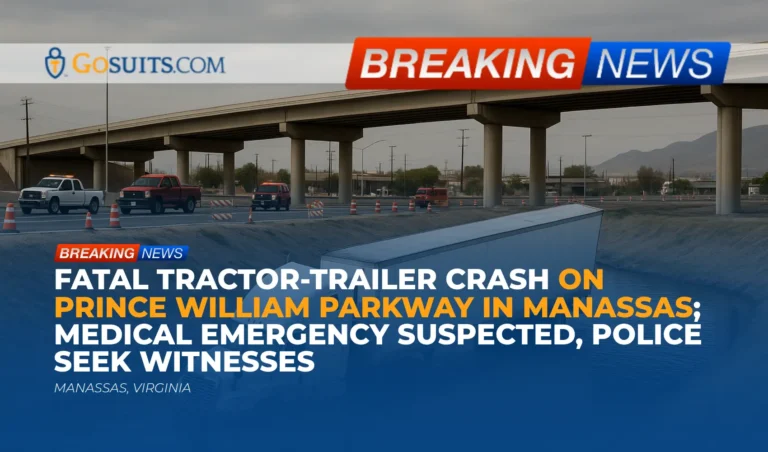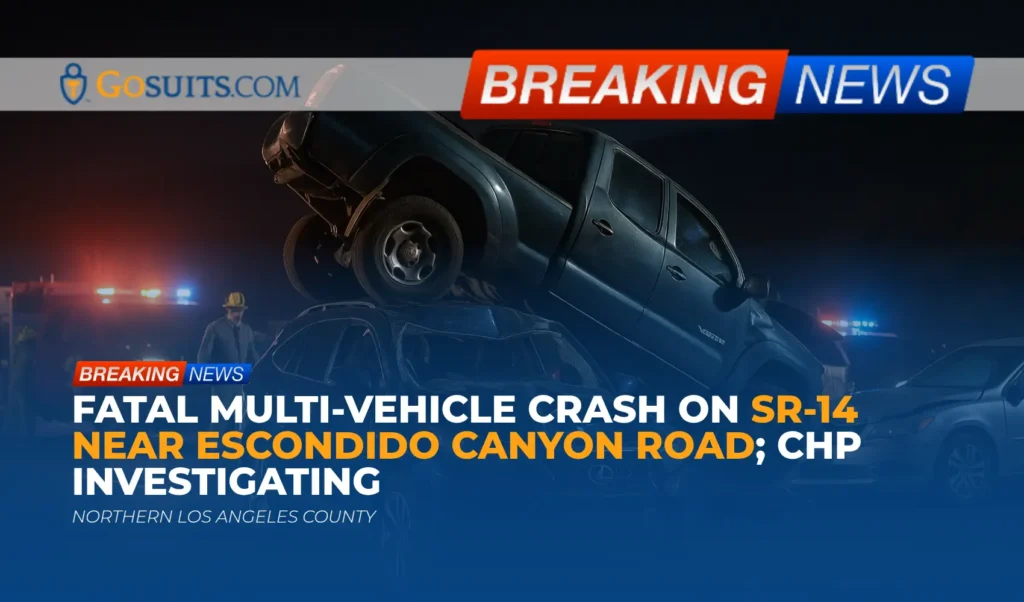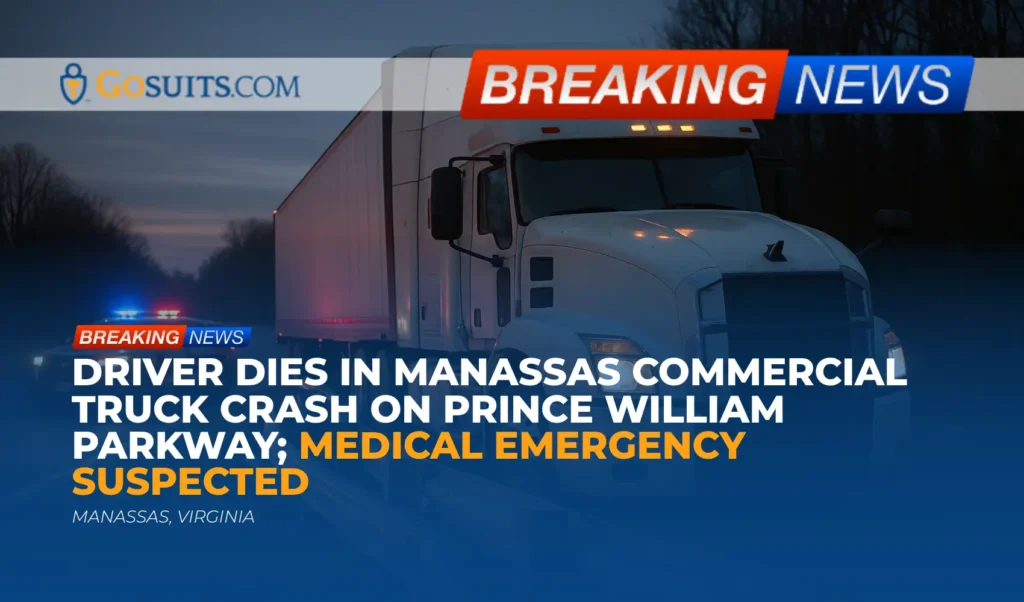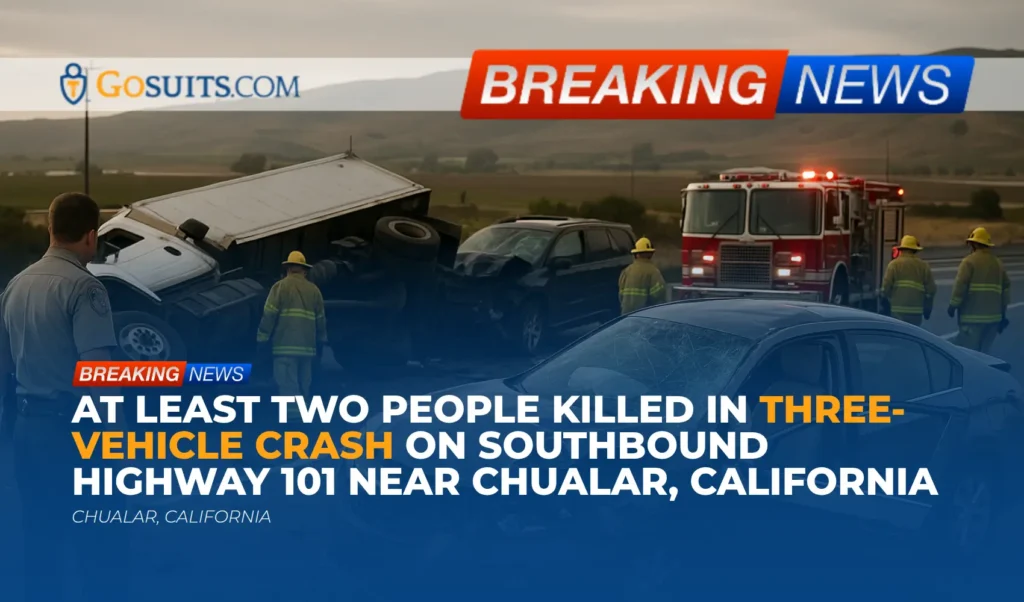- What We Know About the Reported Truck Crash on Prince William Parkway
- Investigation Status and What Authorities Typically Examine
- Roadway and Safety Context for the Prince William Parkway Area
- Immediate, Practical Steps Families Can Consider
- Who to Contact for Official Records and Information
- Legal Insights: Potential Liability, Insurance, and Rights After a Fatal Commercial Vehicle Incident
- Evidence and Documentation to Preserve Early
- Data and Safety Background: Large Trucks and Virginia Crash Trends
- If You Witnessed the Crash
- Commentary from Gosuits Manassas, Virginia Personal Injury Attorney
- Why Acting Promptly Matters After a Serious Truck Crash
- Sources and References
What We Know About the Reported Truck Crash on Prince William Parkway
According to local reporting, a fatal single-vehicle truck crash occurred in the early morning hours in the Manassas area. A 35-year-old California resident was driving a 2022 Mack Anthem tractor-trailer eastbound on Prince William Parkway near Hansen Farm Road (formerly Balls Ford Road) at approximately 4:45 a.m. on October 12. The vehicle left the roadway, struck a guardrail, and came to a stop a short distance later. The driver was transported to a local hospital and was later pronounced deceased. Investigators indicated the driver may have experienced a medical emergency before the crash. Authorities requested that any witnesses contact the police as the investigation continues.
These are the key facts shared publicly at this time. No additional details about cargo, employer, road conditions, weather, or other contributing factors were included in the report. Because investigations into commercial vehicle incidents involve multiple steps and agencies, more information may emerge in the coming days and weeks.
Investigation Status and What Authorities Typically Examine
When a serious incident involves a commercial truck, law enforcement and, at times, other agencies focus on a careful reconstruction of events. While we do not know the full scope of the investigation in this case, the following types of information are commonly reviewed to understand what happened and why:
- Scene documentation: Measurements, skid or yaw marks, vehicle final rest positions, roadway geometry, and guardrail contact points.
- Vehicle condition: Steering, braking systems, lights, tires, and data from the truck’s electronic control modules (ECM). Many commercial trucks also have telematics that may record speed, throttle position, and braking inputs.
- Electronic logging devices (ELDs): For interstate carriers, federal rules require ELDs to record driver hours-of-service. These records help investigators understand whether fatigue could have been a factor. See the Federal Motor Carrier Safety Administration’s guidance on ELDs at FMCSA ELDs.
- Driver medical qualification: Interstate commercial drivers must meet medical qualification standards and carry a current medical examiner’s certificate per federal regulations. See FMCSA medical requirements.
- Post-accident testing requirements: Depending on the circumstances, federal rules may require post-accident alcohol and controlled substances testing by the motor carrier. See 49 CFR 382.303 at the eCFR: Post-accident testing.
- Medical and autopsy findings: If a medical issue is suspected, information from emergency responders, hospital records, and the medical examiner’s office can be central to determining whether an unforeseen medical condition precipitated the crash.
- Witness statements and nearby cameras: Drivers in the area, fixed security cameras, and traffic cameras can provide critical context, including vehicle movements before leaving the road.
Because investigators in this report mentioned a possible medical emergency, medical records and the medical examiner’s findings may be particularly important to understanding causation.
Roadway and Safety Context for the Prince William Parkway Area
Prince William Parkway serves as a major corridor in the Manassas and Prince William County area, carrying commuter traffic as well as commercial vehicles at various hours. Early morning travel can involve reduced visibility and fewer other drivers on the road, but also a higher likelihood of fatigue among long-haul drivers. The reported location near Hansen Farm Road is a developed logistics corridor where heavy vehicles are common.
Guardrails are designed to redirect vehicles and reduce the severity of certain types of crashes rather than prevent every off-road departure. The Federal Highway Administration describes roadside safety hardware such as guardrails as part of a system intended to mitigate crash severity, with performance depending on impact angle, speed, and vehicle characteristics. For general background, see FHWA’s roadside hardware information at FHWA Roadside Hardware.
In this incident, the truck left the roadway and struck a guardrail before stopping. Without speculating, investigators will typically document guardrail contact and vehicle dynamics to understand the sequence and energy of the impact.
Immediate, Practical Steps Families Can Consider
Families coping with sudden loss deserve clarity and compassionate guidance. While every situation is unique, the steps below can help ensure key information is preserved and accessible later. These are general suggestions for awareness and do not substitute for legal counsel.
- Identify and secure official records early: Police crash reports, incident reports, and later the medical examiner’s findings will form the factual foundation of what happened.
- Preserve personal items and data: If the driver carried a phone, dash camera, or personal GPS, preservation of those devices and cloud backups can be important.
- Note potential witnesses: Keep track of anyone who saw the event, stopped to help, or spoke to first responders.
- Consult a qualified attorney before speaking with insurance companies: Statements to insurers can be recorded and may be used in later proceedings; a free consultation can help you understand rights and obligations before making any formal statements.
- Coordinate with the employer if the incident occurred during work: If the driver was on duty, workers’ compensation death benefits may be available, and the employer should preserve records such as ELD data, driver qualification files, and maintenance records.
Who to Contact for Official Records and Information
Police Crash Report and Incident Records
The local police agency handling the scene generally maintains the primary crash report. In the Manassas area, the Prince William County Police Department provides records services and publishes contact information on its official site: Prince William County Police Department. Families or authorized representatives can typically request the crash report, photographs, and, where available, 911 recordings consistent with Virginia law and departmental policy.
Medical Examiner and Autopsy-Related Information
Virginia operates a state medical examiner system. For deaths under investigation, the Office of the Chief Medical Examiner (OCME) evaluates cause and manner of death. Next of kin can request information and, when available, copies of autopsy findings through the Virginia Department of Health’s OCME. See Virginia Office of the Chief Medical Examiner.
Death certificates are handled through the Virginia Department of Health’s Division of Vital Records. Information on obtaining certified copies is available here: VDH Vital Records.
Hospital and EMS Records
Hospitals and EMS providers maintain medical records of evaluation and care. Under federal privacy rules, a decedent’s personal representative generally may access their medical records. The U.S. Department of Health and Human Services provides guidance on the Right of Access: HHS HIPAA Right of Access.
Employer and Federal Trucking Records
When a crash involves a commercial motor vehicle during work, several categories of records may exist:
- Electronic logging device (ELD) data and hours-of-service records. See FMCSA Hours-of-Service rules and ELD overview.
- Driver medical qualification records, including the current medical examiner’s certificate. See FMCSA medical requirements.
- Post-accident testing documentation if required under 49 CFR Part 382. See 49 CFR 382.303.
These records are often time-sensitive. A preservation request sent early can help prevent automatic deletion or overwriting.
Legal Insights: Potential Liability, Insurance, and Rights After a Fatal Commercial Vehicle Incident
Every commercial vehicle crash is fact-specific, and responsibility can hinge on details that are not immediately clear. Below are general considerations that commonly arise in fatal trucking incidents.
Medical Emergency as a Factor
When investigators note a possible medical emergency, the analysis often focuses on foreseeability and compliance with medical qualification standards. Federal rules require interstate commercial drivers to meet physical qualifications and hold a current medical examiner’s certificate. If a medical event was truly sudden and unforeseeable, that can complicate theories of negligence. Conversely, if an employer or driver ignored known medical limitations or allowed a lapsed medical certificate, different questions may arise about decision-making and compliance. See FMCSA medical requirements.

Employer Responsibilities and Vicarious Liability
Motor carriers have duties to vet and train drivers, monitor hours-of-service, and maintain vehicles. If a driver was acting in the course of employment, the employer may be responsible under vicarious liability for negligent acts within the scope of employment. Additionally, compliance with federal safety regulations, including hours-of-service and post-accident testing where applicable, is a recurring focus. See FMCSA Hours-of-Service and 49 CFR 382.303.
Wrongful Death in Virginia
Virginia law allows certain beneficiaries to bring a civil action for wrongful death arising from a negligent act or omission. See Virginia Code § 8.01-50 at Virginia Code § 8.01-50. Time limits apply; in many circumstances, the action must be filed within two years of death as set out in Virginia Code § 8.01-244 at Virginia Code § 8.01-244. These statutes are provided for general informational purposes only.
Workers’ Compensation Death Benefits
If the driver was on duty at the time of the incident, Virginia’s workers’ compensation system may provide death benefits to eligible dependents. The Virginia Workers’ Compensation Commission provides information about claims and benefits at Virginia Workers’ Compensation Commission. Workers’ compensation can be significant in transportation-related fatalities, regardless of fault, while separate third-party claims may also be evaluated depending on the facts.
Insurance Considerations for Commercial Trucks
Interstate motor carriers must maintain minimum levels of liability insurance under federal rules, with required amounts depending on cargo. See FMCSA financial responsibility. These commercial policies can be complex, with layers of coverage and multiple insurers. Adjusters may contact families quickly; anything said can be recorded, and even well-intentioned statements can be misinterpreted. It is prudent to consult an attorney before providing recorded statements or signing documents.
Roadway and Equipment Issues
In some crashes, issues beyond driver actions are implicated, such as vehicle component failures or roadway maintenance. FHWA notes that guardrails and other roadside hardware are designed to reduce severity but cannot prevent all outcomes. See FHWA Roadside Hardware. Whether any roadway condition played a role here is not known from the report.
Evidence and Documentation to Preserve Early
Important information can fade or be overwritten soon after a crash. Early preservation increases the chance of a complete picture later. Consider the following categories:
- Vehicle data: ECM downloads, telematics, and dash camera footage.
- Driver records: Medical examiner’s certificate, training records, and hours-of-service logs and ELD exports.
- Employer records: Maintenance logs, dispatch records, load assignments, and post-accident testing documentation.
- Scene materials: Photographs, video, witness contact information, and any business surveillance footage in the area.
- Medical documentation: EMS run sheets, hospital records, and, when available, medical examiner findings related to cause of death.
Because data retention policies vary, a written preservation request sent to relevant parties promptly can be essential.
Data and Safety Background: Large Trucks and Virginia Crash Trends
Understanding the broader safety context can help families make sense of the investigation’s focus areas.
- National large truck safety: NHTSA provides information on large truck crashes and contributing factors nationwide. See NHTSA: Large Trucks for national data and safety analyses. While each case is unique, investigators commonly consider speed, fatigue, medical events, and roadway departure dynamics in single-vehicle truck crashes.
- Virginia crash data: The Virginia Department of Motor Vehicles publishes statewide crash facts and trends. See Virginia DMV Crash Data for annual summaries. These reports break down roadway departure crashes, time-of-day patterns, and heavy vehicle involvement.
These resources provide factual background. They do not determine fault in any individual incident, including the one reported here.
If You Witnessed the Crash
Local police asked anyone who witnessed the incident to contact them as the investigation continues. Even small details can help, such as observations of vehicle behavior moments before leaving the roadway, lighting conditions, or any hazards noticed nearby. The official site for the local department is here: Prince William County Police Department.

Commentary from Gosuits Manassas, Virginia Personal Injury Attorney
We extend our sincere condolences to those grieving this loss. This article was prepared to share general information and context about investigations and rights after a serious commercial vehicle crash. It is meant for educational purposes and to help the community understand what steps may come next.
Based on the information shared publicly, investigators are considering a possible medical emergency. In cases like this, the key questions often revolve around what was foreseeable and what records exist to verify driver qualification and health status. Thorough, respectful inquiry is important both to honor the person’s memory and to provide clarity for those left behind.
It is common for insurance companies and large corporations to move quickly after an incident. Adjusters may seek statements, releases, or authorizations before families have had a chance to gather the facts. These early interactions can influence how a claim is evaluated. Without full access to records like ELD data, medical examiner findings, and employer files, families may be at an information disadvantage.
Early, no-cost consultations can make a difference by helping people understand timelines, what documents to request, and how to avoid missteps with insurers. Speaking with a seasoned and skilled advocate before engaging with insurance representatives can help protect rights and ensure the process remains grounded in verifiable facts.
Why Acting Promptly Matters After a Serious Truck Crash
The most effective next steps are practical and time-sensitive. Here is what to do, why it matters, and when timing becomes critical:
- Request official records quickly: Ask the local police department for the crash report and any available supplements. Benefit: These documents anchor the timeline and can be required by insurers. Urgency: Some materials, like 911 audio or nearby surveillance, may be retained for limited periods.
- Coordinate with the medical examiner and hospital: Seek updates on cause and manner of death and request medical records as the personal representative. Benefit: Clarity on medical issues can inform insurance benefits and legal decisions. Urgency: Medical examiner reports may take time; starting early helps manage expectations.
- Send preservation notices for truck and employer records: Ask that ELD logs, ECM data, driver qualification files, dispatch records, and maintenance logs be preserved. Benefit: Prevents automatic overwriting or routine deletion of critical data. Urgency: Some electronic systems overwrite within days or weeks.
- Document financial and family impacts: Maintain a record of expenses, services provided by the decedent, and dependents’ needs. Benefit: Accurate documentation supports benefit claims. Urgency: Early details are easier to capture accurately.
- Speak with an attorney before contacting insurers: Understand your rights before giving recorded statements or signing medical releases. Benefit: What is said to an insurer can be used later and may affect coverage evaluations. Urgency: Insurers may call soon after an event; a brief consultation first can help avoid avoidable mistakes.
- Consider workers’ compensation if the incident occurred on duty: Identify the employer’s workers’ compensation carrier and the claim process. Benefit: Death benefits may help with immediate financial needs while other investigations continue. Urgency: Claims have filing deadlines and notice requirements.
Acting promptly helps ensure key data is preserved, timelines are met, and decisions are made with the best available information. Waiting can result in lost evidence and fewer options.
Sources and References
These resources provide factual background on procedures, safety standards, and rights relevant to commercial vehicle incidents in Virginia and nationwide.
- Prince William County Police Department — Official department site for records and public information.
- Virginia Office of the Chief Medical Examiner (VDH) — Information on autopsy reports and medical examiner processes.
- Virginia Vital Records (VDH) — Guidance on obtaining death certificates.
- HHS HIPAA Right of Access — Federal guidance on access to medical records.
- FMCSA Medical Requirements — Federal standards for commercial driver medical qualification.
- FMCSA Hours-of-Service Rules — Overview of federal driving time limits.
- FMCSA Electronic Logging Devices — ELD background and requirements.
- 49 CFR 382.303 — Post-accident testing requirements for alcohol and controlled substances.
- FMCSA Financial Responsibility — Minimum liability insurance requirements for motor carriers.
- FHWA Roadside Hardware — Federal guidance on guardrails and other roadside safety devices.
- NHTSA: Large Trucks — National large truck safety information and data.
- Virginia DMV Crash Data — Statewide crash facts and trends.
- Virginia Code § 8.01-50 — Wrongful death statute.
- Virginia Code § 8.01-244 — Limitations period for wrongful death actions.
- Virginia Workers’ Compensation Commission — Claims and benefits information.






